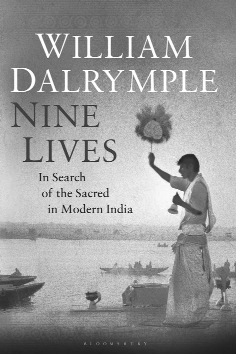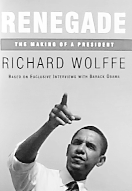|
Non-fiction 2009
Odes to Obama & Oriental rule
Harsh Desai
Five books have been
selected for you this year and each deserves a place on your shelf.
One is a book about the historic Obama election; one is the biography
of the greatest American short story writer, one is a travelogue
through the heart of Islam, another a search for the sacred in India,
and the fifth is a book about the wizards of finance.
-
 Nine
Lives’ in Search of the Sacred in Modern India (by William
Dalrymple): William Dalrymple’s latest book moves effortlessly
from the foothills of the Himalayas to the Cauvery Delta, from the
deserts of Rajasthan to Rural West Bengal, all in search of the
sacred in modern India. He makes an attempt through the
examination of nine lives, including that of a Buddhist monk who
spent most of his life in the Indian army and was trying to
expatiate that sin by printing prayer flags in Dharmasala; to the
story of the Jain nun, who, despite the fact that she was in
perfect health, was determined to starve herself to death in a
ritual known to the Jains as Salekhana; to the story of the Bhopas,
who in an incredible feat of memory recited entire stories over
four to five nights invoking God. The book also travels to a sufi
shrine in rural Sind, where the red fairy propitiates the gods in
a ritual known as dhamaal. Dalrymple travels to a remote
part of the country to meet people who in some way or another are
connected to things godly; he gets the back story of all these
people from their childhood to where they are today and it makes
fascinating reading. It also tells you how intrinsically our lives
are bound up with the religious and the sacred. Nine
Lives’ in Search of the Sacred in Modern India (by William
Dalrymple): William Dalrymple’s latest book moves effortlessly
from the foothills of the Himalayas to the Cauvery Delta, from the
deserts of Rajasthan to Rural West Bengal, all in search of the
sacred in modern India. He makes an attempt through the
examination of nine lives, including that of a Buddhist monk who
spent most of his life in the Indian army and was trying to
expatiate that sin by printing prayer flags in Dharmasala; to the
story of the Jain nun, who, despite the fact that she was in
perfect health, was determined to starve herself to death in a
ritual known to the Jains as Salekhana; to the story of the Bhopas,
who in an incredible feat of memory recited entire stories over
four to five nights invoking God. The book also travels to a sufi
shrine in rural Sind, where the red fairy propitiates the gods in
a ritual known as dhamaal. Dalrymple travels to a remote
part of the country to meet people who in some way or another are
connected to things godly; he gets the back story of all these
people from their childhood to where they are today and it makes
fascinating reading. It also tells you how intrinsically our lives
are bound up with the religious and the sacred.
-
Stranger to
History (by Aatish Taseer): This supremely well-written book
is particularly relevant to the times. It is a personal journey
the author takes on a dare from his father to discover both his
personal identity and his religious identity. Aatish travels from
Turkey to Syria to Saudi Arabia to Iran to Pakistan to understand
his Muslim identity better and the journey is full of revealing
glimpses into the difference between the countries and interesting
encounters with the locals. And it is never short of adventure.
For instance, he is present in Damascus when the Danish embassy is
burnt after the cartoons controversy engulfs the Islamic world and
he is interviewed, entangled by the Iranian secret service when he
is in Tehran.
The chapters of his
travels are interspersed with chapters about the story of his
Pakistani Muslim father and his Sikh Indian mother and their whirlwind
romance marriage and separation and his attempts, sometimes desperate,
to get to know his father better and penetrate his wall of
indifference.
-
 Renegade
(by Richard Wolffe): The 2008 election was a poll the Americans
regarded as the election of their lifetime, an election that could
potentially make or break America. And the man elected was the
first black President. So, it was historic – but how was this
done; how did this community organiser from Chicago go on to
become the 44the President of the United States of America, What
sparked the election? How were the millions of dollars raised? How
did he taken on the Clinton machine. What happened after the
victory in Iowa turned into defeat in New Hampshire and nearly
derailed the campaign. Richard Wolffe of Newsweek magazine, who
had a ringside view of the campaign, takes you on a whirlwind
tour: how was history made brick by brick. How did the slogan ‘Yes
we can’ come into existence. How did Obama react to an early
primary defeat? This is a book worth having on your shelf. Renegade
(by Richard Wolffe): The 2008 election was a poll the Americans
regarded as the election of their lifetime, an election that could
potentially make or break America. And the man elected was the
first black President. So, it was historic – but how was this
done; how did this community organiser from Chicago go on to
become the 44the President of the United States of America, What
sparked the election? How were the millions of dollars raised? How
did he taken on the Clinton machine. What happened after the
victory in Iowa turned into defeat in New Hampshire and nearly
derailed the campaign. Richard Wolffe of Newsweek magazine, who
had a ringside view of the campaign, takes you on a whirlwind
tour: how was history made brick by brick. How did the slogan ‘Yes
we can’ come into existence. How did Obama react to an early
primary defeat? This is a book worth having on your shelf.
-
The Sages: Warren
Buffett, George Soros, Paul Volcker and the Maelstrom of Markets
(by Charles R Morris): This book contains three lengthy
biographical essays about three famed wizards who dominated
financial markets for the second half of the 20th century, one as
a regulator. They are stories of how great the influence of the
three was though they were in very different fields – Soros and
Buffett though investing and fund managers with completely
different investment styles and Volcker, who was the Federal
Reserve Chairman for eight long years, played a central part in
taming the demon of inflation in America in the eighties. The book
shows that investing at its best is an art rather than a science
and luck plays a part. But all three had a steady hand and
longevity was their trump card. In these troubled economic times
as the stock markets rise and fall this is a book worth having at
your side.
-
Cheever A Life
(by Blake Bailey): This is probably the literary biography of the
year. It is about the troubled life of John Cheever regarded by
many as one of the greatest short story writers that America has
produced though one who was plagued all through his life by his
struggle with drink, money, his sexuality and his troubled
relations with his family. In his personal journal in his years,
when he was writing for the New Yorker, he was sometimes so
anguished about his lack of recognition and travails with money
that in his despondency he thought of committing suicide. This
despondency followed him for most of his life.
One of his great
struggles was making the transition from a short story writer to a
writer of novels; a transition, which he made successfully, but it
took a lot out of him. This big gossipy biography is so detailed and
so precise that it is a storybook with Cheever could have approved of.
This is a book worth having on your shelf.
|